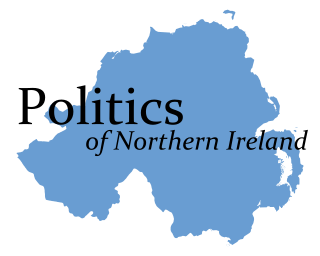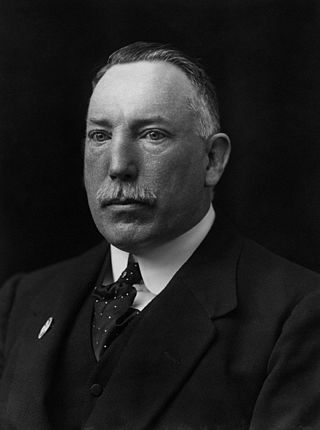Related Research Articles
The Social Democratic and Labour Party is a social-democratic and Irish nationalist political party in Northern Ireland. The SDLP currently has eight members in the Northern Ireland Assembly (MLAs) and two members of Parliament (MPs) in the House of Commons of the United Kingdom.

Fermanagh District Council was a local council in Northern Ireland. It was created out of Fermanagh County Council and later merged with Omagh District Council in April 2015 under local government reorganisation to become Fermanagh and Omagh District Council.

West Tyrone is a parliamentary constituency in the United Kingdom House of Commons. The current MP for the constituency is Órfhlaith Begley of Sinn Féin.

Mid Ulster is a parliamentary constituency in the UK House of Commons. The current MP is Francie Molloy of Sinn Féin.

Fermanagh and South Tyrone is a parliamentary constituency in the British House of Commons. The current MP is Michelle Gildernew of Sinn Féin.
The by-election held in Fermanagh and South Tyrone on 9 April 1981 is considered by many to be the most significant by-election held in Northern Ireland during the Troubles. It saw the first electoral victory for militant Irish republicanism, which the following year entered electoral politics in full force as Sinn Féin. The successful candidate was the IRA hunger striker Bobby Sands, who died twenty-six days later.
Paul Butler is a republican politician in Northern Ireland and a former member of the Provisional Irish Republican Army. He served as a member of the Northern Ireland Assembly for Lagan Valley from 2007 to 2011.

Elections for local government were held in Northern Ireland in 1989, with candidates contesting 565 seats.

Elections for local government were held in Northern Ireland on 15 May 1985, contesting 565 seats in all.

The first election to Fermanagh and Omagh District Council, part of the Northern Ireland local elections on 22 May 2014, returned 40 members to the newly-formed council via Single Transferable Vote.

The 2015 United Kingdom general election in Northern Ireland was held on 7 May 2015 and all 18 seats were contested. 1,236,765 people were eligible to vote, up 67,581 from the 2010 general election. 58.45% of eligible voters turned out, an increase of half a percentage point from the last general election. This election saw the return of Ulster Unionists to the House of Commons, after they targeted 4 seats but secured 2.

The 1924 Northern Irish local elections were held in January & June 1924 for the various county & district councils of Northern Ireland. The election followed changes by the Unionist government, which had redrawn electoral districts, abolished PR for local elections, and implemented a requirement for members of local authorities to take an oath of allegiance.

A by-election was held in the UK Parliament constituency of West Tyrone on 3 May 2018, following the resignation of Barry McElduff, who had been the Member of Parliament (MP) since 2017. McElduff had become embroiled in a social media controversy which had resulted in his suspension from Sinn Féin on 8 January. He announced his resignation on 15 January 2018.

Local elections were held in Northern Ireland on Thursday 2 May 2019. The last elections were held in 2014. 819 candidates contested 462 seats across Northern Ireland's 11 local government districts. 1,305,384 people aged 18 and over were eligible to vote, and 52.7% of the electorate turned out.

Elections took place for Fermanagh and Omagh District Council on 2 May 2019, part of that year's local elections. 40 Councillors were elected via STV.
Elections to Omagh District Council were held on 17 May 1989 on the same day as the other Northern Irish local government elections. The election used three district electoral areas to elect a total of 21 councillors.
Elections to Fermanagh District Council were held on 17 May 1989 on the same day as the other Northern Irish local government elections. The election used four district electoral areas to elect a total of 23 councillors.

Local elections were held in Northern Ireland on 18 May 2023. The elections were delayed by two weeks to avoid overlapping with the coronation of King Charles III. Following the elections, Sinn Féin became the largest party in local government for the first time. It also marked the first time that nationalist parties had garnered a greater share of the vote than unionist parties.
Mid Tyrone is one of the seven district electoral areas (DEA) in Fermanagh and Omagh, Northern Ireland. The district elects six members to Fermanagh and Omagh District Council and contains the wards of Beragh, Drumnakilly, Gortin, Owenkillew, Sixmilecross and Termon. Omagh forms part of the West Tyrone constituencies for the Northern Ireland Assembly and UK Parliament.
Erne West is one of the seven district electoral areas (DEA) in Fermanagh and Omagh, Northern Ireland. The district elects five members to Fermanagh and Omagh District Council and contains the wards of Belcoo and Garrison, Boho, Cleenish and Letterbreen, Derrygonnelly, Derrylin and Florence Court and Kinawley. Erne West forms part of the Fermanagh and South Tyrone constituencies for the Northern Ireland Assembly and UK Parliament.
References
- 1 2 3 4 5 Gordon Gillespie (2009). The A to Z of the Northern Ireland Conflict. Scarecrow Press. ISBN 978-0810870451. p. 135.
- ↑ Irish Independence Party Irish Election Literature
- 1 2 1981 local elections results, ARK.ac.uk, accessed 2 August 2013
- ↑ Elliott, S. (1983). The 1982 Northern Ireland Assembly election. Centre for the Study of Public Policy, University of Strathclyde. p. 23.